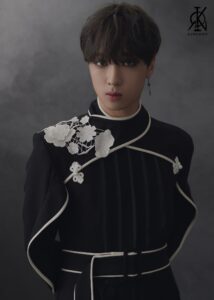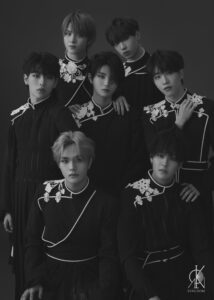
Kingdom’s History of Kingdom: Part II. Chiwoo explores the fall of a Shangri-La utopia and is influenced by the legendary Hmong emperor Chiyou (Chiwoo in Korean). The album is overall a mix of traditional and modern elements that make the album interesting and memorable, but also edging on the potentially problematic.
Because the intended concept of the group itself is based on each member representing a historical king or ruler, it comes as no surprise that GF Entertainment are leaning into foreign concepts and aesthetics. In this second installment, Chiwoo is the protagonist, drawing upon history of the war deity Chiyou, who fought against the Yellow Emperor. Because of the splintering of the Miao people following a battle at Zhuolu plains, many Hmong regard Chiyou as an ethnic ancestor while some question his Hmong ethnicity entirely. He is regarded as one of China’s forefathers alongside his Han counterparts, and to many Hmong he is called “Xib Ywj” or “Great Grandfather.”
According to oral histories and archival data, the Hmong were farmers who struggled to remain independent amidst conflict with Imperial China. After China used military forces to suppress minorities and smaller kingdoms, the Hmong were forced out of their homelands and into the mountainous regions of Southeast Asia today known as Myanmar (Burma), Thailand, Laos, and Vietnam. The Hmong people continue to reconstruct and reclaim their history following colonization and conflict with China as well as other colonial powers until well after the world wars.

In Kingdom’s case for this release, imagery is based on a mix of Chinese aesthetics, Hmong oral history, as well as the allure of the mystical Shangri-La, a term coined by a fictional account in the novel Lost Horizon and based on the ancient Tibetan depiction of Shambala. They do not outright acknowledge any of these similarities however.
Cultural appropriation refers to the “unacknowledged or inappropriate adoption of the customs, practices, ideas, etc. of one people or societies by members of another and typically more dominant people or society” according to Oxford Dictionaries. The balancing act between cultural appropriation and cultural appreciation is a nuanced one, and often the difference lies in the way that artists pay homage to original artists and recognize the roots of the people of which they borrow from. Culture is fluid, but the engagement of artists in a culture only for shock or aesthetic value ignores the contexts from which it came, contributing to the appropriation of a given people.
While in this case it is hard to say where appreciation meets appropriation, the usage of these elements without any outright explanation or acknowledgement starts to become problematic, especially given the longstanding oppression of the Hmong people as a minority in China. The implications are complex and multifaceted, and with the album just having been released, it remains to be seen how domestic and international reception will grapple with these elements.

As for the music itself, the tracks are relatively diverse in the way that the sound, all centering around a magical, nirvana-esque concept. There is not much of a storyline like in History of Kingdom: Part I. Arthur, but the MV does seem to suggest that karma causes Chiwoo’s kingdom to fall, becoming only a “lost memory.” The first two tracks outline this storyline and setting, but the remaining tracks contribute only in subject.
The intro “Intro: Echoes of Nirvana” and “KARMA” both use similar instrumentation and themes. It may be a stretch, but it sounds like the OST for a fantasy drama that takes place in a faraway paradise that viewers are just beginning to discover. Because of the intended concept, it sounds like the erhu and guzheng can be heard intermingling with modern electric instruments and production polish. I do not claim to be an expert on these instruments, but given the story that members are conveying, it could make sense.
The introduction is especially evocative given its sweeping sound, full instrumentation, and contrasting sections that bleed into each other. The beginning is calmer and sweeter, like the viewer just entering a fantasy realm, the middle is upbeat, tense, and exciting, and the ending is dark and open-ended. The last five seconds of the song are an open chord that fades into nothing.
The title track “KARMA” is really the glue that holds the album concept together. With a unique instrumentation from your typical K-pop selection, the song is exciting and evocative. The bass and vocals are prevalent in the mix with some interesting gang vocals in the chorus. The bassline is especially fascinating and satisfying to listen to throughout the song, especially in the loud, busy choruses.
Implications aside, the MV is stunning. The sets, clothing, and decorative pieces exude regality and prestige, setting the mood and immersing the listener in Chiwoo’s world. Members sport both darker outfits (the red and black ones) as well as delicate, icy blue robes. As the MV progresses, the cinematography and choreography become increasingly brooding and frenetic with quick flashes of each scene before ending in a complex formation with Chiwoo at the top.
Each scene looks to be a different section of Chiwoo’s palace including a throne room, a dim window lit room with bars on the windows, and a brightly lit room filled with long silk curtains. The dancers have tailed silk fans and long rectangles of fabric in a variety of colors that accentuate their movements and formations with the members.

The end of the MV after the title track foreshadows their next comeback centering around Ivan, based off the Russian ruler of the same name (hopefully Ivan the terrible to make things interesting!) He is seen standing amidst a snowy forest alone before the camera zooms into his eye as it turns a milky, unnatural white color. With the tzars being a bit less elusive to the history books, it will be interesting to see what otherworldly slant they incorporate into this next installment of the worldbuilding.
The rest of the tracks are centered around mysticality and fate. “Magical” and “MAKE US” are up-tempo straightforward pop tracks, “Warning” is a funky sexy song, and “Eternity” rounds out the album nicely as a breathtakingly delicate ballad.
“Magical” and “MAKE US” sound the most alike on the album aside from “Echoes of Nirvana” and “KARMA.” The instrumentation for “Magical” is mostly midi-heavy with a loud, busy texture, and the chorus is satisfyingly addictive. The last track “MAKE US” is noticeable softer with relatively high vocals and a slower overall tempo. The backbeat is slow alongside the soaring vocals, creating a nice contrast with the drum set part.
Perhaps the most interesting and earworm track on the album is “Warning.” The bassline is funky, repetitive, and incredibly loud in the overall mix to accompany the members’ sultry vocals. The range of the vocal lines teeters between their stronger chest voices and the transition to their mixed voice, showcasing some serious control. Additionally, the rappers’ edgy verses juxtapose the more sensual vocal lines and funky instrumental tracks. “Warning” is the most memorable track on the album, sticking out from any other song on their discography so far.
Rounding out the album is the ballad “Eternity.” A complete 180 from the title track, “Eternity” is soft, sweet, and tear-jerking. The vocal lines are relatively high and smooth, blending nicely with the piano driven harmonies and finger snaps.

Kingdom’s Kingdom: Part II. Chiwoo explores a mix of traditional and contemporary elements, drawing influence from Chinese aesthetics. The imagery and concept are stunning and eye-catching, but could be construed as potentially problematic, especially given the usage of Chinese, Hmong, and Tibetan cultural elements. The members have certainly stepped up the (ex)caliber of their performances, and luckily the music that accompanies this release have a couple of B-side gems and truly gorgeous visuals. However, I remain wary of the world-building and cultural borrowing with each release that GF Entertainment have locked their members into. Here’s to hoping that Kingdom and their company have done their homework well in advance.
(Hmong Lessons, Minnesota Historical Society, The Week, Harper’s Bazaar, The Atlantic, PBS, YouTube, Images via GF Entertainment)


